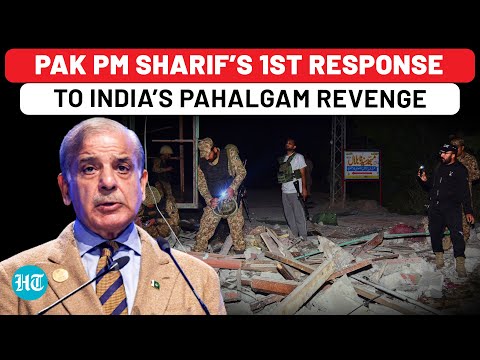More than forty hours have passed since the missile strikes by Indian military on the nine terror camp sites in Pakistan. The situation in both New Delhi and Islamabad is witnessing the same type of preparations indicating that Pakistan is getting ready for another military confrontation with India after the Kargil war in 1999. Pakistan Prime Minister Shehbaz Sharif in a nationwide address on Wednesday night warned India that it will avenge ‘’ each drop of the blood of our martyrs”. Army Chief General Asim Munir along with two other chiefs was authorized to take corresponding retaliatory action against India.
In Pakistan, the scenario is similar on the line Indian Prime Minister Narendra Modi faced the situation after the Pahalgam massacre on April 22 in which 25 Hindu tourists and one local Muslim were brutally shot to death by the terrorists with Pak links. The entire country including the political parties were calling for revenge against Pakistan. PM Modi through his remarks in a political meeting in Bihar and later at series of meetings with the military chiefs expressed his unambiguous determination to retaliate. There was no other option apart from striking at the Pakistani terror sites after all what he was saying.
Similarly in Pakistan, Prime Minister Shehbaz Sharif is under tremendous pressure to go for retaliation against India. All the political parties have supported him, including PTI of Imran Khan. The security forces are now in the mode of starting military action. But what will be the nature of retaliation remains a big dilemma for Pakistan. Can Pakistan, in the present state of economic crisis and serious troubles in Balochistan and a part of Khyber Paktunkhwa, afford a full-fledged military action in India?
Indian side has been constantly saying that the IAF did the strikes at the nine sites which camped the terrorists responsible for attacks on India from time to time. The objective was limited to the destruction of these terror camps only, no military sites were struck by IAF. Pakistan can hardly deny this. There is a general perception globally that Pakistan shelters the terrorists many of whom operate against India from time to time. Pakistan can not claim that India has terror camps where it can strike. So Pakistan has to strike only at the military or civilian sites in India if it wants to retaliate. The increase in shelling in the border areas will not make any impact on the Pakistani people. They want to see hard loss for India.
Only in the last two days, the rebel Baloch army hit back at the Pak troops and killed 14 soldiers. The Pak army has to put adequate troops in the Baloch area as also along Afghan borders where the TTTP troops are active. The Taliban Government in Kabul is not in good terms with Pakistan. Rather in recent days, Kabul’s relations with New Delhi have vastly improved. Pakistan can hope for China to do some sabre rattling on the borders with India to embarrass New Delhi. But that might not happen as the present trends of Chinese foreign policy indicate. China may give some assistance to Pakistan in the United Nations and through statements, but China will not like to be physically involved in any full scale confrontation between India and Pakistan.
Already, both India and Pakistan are under tremendous pressure so that no further escalation takes place. The US officials are constantly in touch. Iran defence minister had talks in Pakistan. He is in New Delhi right now. Saudi minister is also active talking to both India and Pakistan. Now the task for them is to persuade Pakistan from taking major retaliatory action. As per India, it has done its limited action. It will not escalate unless Pakistan retaliates with bigger military strikes.
So the entire onus is on the Pakistani Prime Minister Shehbaz Sharif. He has to decide whether he will surrender to the high pressure of hyper nationalism in Pakistan with religious overtones or taking into account Pakistan’s future, he will opt for a dialogue giving up the move for retaliatory action. Shehbaz is being advised by his elder brother the former Prime Minister Nawaz Sharif who is level headed and who has been advising his younger brother to look at all the other options before jumping to any retaliatory action. Pakistan may get assurance for increased aid from the west Asian countries if the government desists from retaliatory action and thereby provoking another war in South Asia. Similarly IMF bailout package will be uncertain if a full fledged war takes place. Next forty eight hours will show which way Pakistan PM and his army chiefs decide? (IPA Service)

 Capital on Edge as Tensions Escalate Along Border
Capital on Edge as Tensions Escalate Along Border 